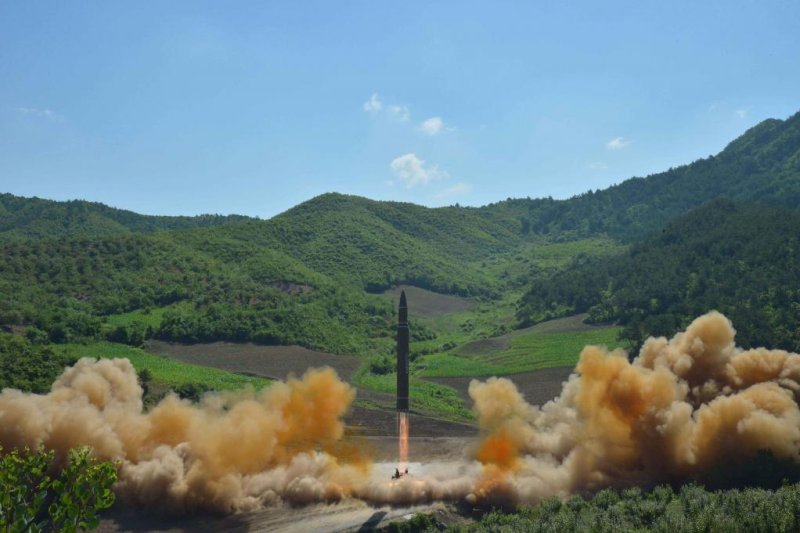A North Korean inter-continental ballistic Hwasong-14 rocket is launched in North Korea on July 4. Officials in Japan and at the Pentagon said North Korea test-fired another missile Friday. Photo by KCNA/EPA
SEOUL, South Korea, July 28 (UPI) -- North Korea launched an improved ballistic missile with intercontinental range late Friday, South Korea's military said, a provocation seen as Pyongyang's answer to Seoul's recent dialogue offer and the international community's move to toughen sanctions.
"North Korea fired a ballistic missile into the East Sea from the vicinity of Mupyong-ri, Jagang Province, at around 11:41 p.m yesterday," the Joint Chiefs of Staff said Saturday.
It flew more than 620 miles at the maximum altitude of around 2,300 miles before landing in the waters between Korea and Japan, added the JCS.
It characterized the projectile as an "advanced type" of an intercontinental ballistic missile, citing its range.
The North's missile launch, the second in less than a month, prompted South Korean President Moon Jae-in to ask U.S. Forces Korea to deploy four additional THAAD interceptor launchers at its new base in Seongju, south of Seoul.
Presiding over a National Security Council meeting, Moon also suggested an allied joint ballistic missile exercise and a U.N. Security Council session to discuss tougher sanctions on Pyongyang, according to his office, Cheong Wa Dae.
In a separate statement, the government emphasized that the North will never be recognized as a nuclear state.
"If North Korea thinks it can get the nuclear power status by repeating nuclear and missile provocations, it's no more than an anachronistic delusion," it said.
It said Pyongyang will only face deepening diplomatic isolation and economic pressure if it continues provocations.
The Pentagon also said it detected the missile launch and was carrying out assessments to determine the details.
"I can confirm that we detected a launch of a ballistic missile from North Korea," Lt. Col. Chris Logan, a Pentagon spokesman, told Yonhap. "We are assessing all the data and will have more information soon."
Gen. Lee Sun-jin, chairman of the JCS, had a 15-minute phone conversation with his U.S. counterpart, Gen. Joseph Dunford. They reaffirmed a robust combined defense posture and agreed to deal sternly with the North's provocation, said the JCS.
The talks were joined by Adm. Harry Harris, commander of the U.S. Pacific Command.
"The three leaders also discussed military response options," Dunford's spokesman, Capt. Greg Hicks said.
In Tokyo, Japanese Chief Cabinet Secretary Yoshihide Suga denounced North Korea for its latest missile launch, saying Japan can not tolerate its repeated provocations. He said the missile flew for about 45 minutes.
The latest launch is widely seen as a snub to the Moon administration, which has sought to engage the communist neighbor.
The North has remained silent on the South's proposal for separate talks on easing border tensions and arranging reunions of families separated by the 1950-53 Korean War.
It also came after U.S. Congress passed a bill imposing a set of tough sanctions on Pyongyang.
The U.N. Security Council is working on a new resolution against the North for its firing of an apparent ICBM on July 4, the U.S. Independence Day.
"It also appears to be a message for China as Jagang Province is close to China," Kim Yong-hyun, a professor of North Korea studies at Dongguk University, said. "I think North Korea had the intention of highlighting the instability of the Armistice Agreement, as the launch came a day after the signing anniversary."
In his Berlin speech in early July, the left-leaning South Korean president demanded the Kim Jong Un regime halt provocative acts as the first step toward inter-Korean reconciliation.
"The missile launch puts the Moon administration in a dilemma," said Yang Moo-jin, a professor at the University of North Korean Studies. "But there won't be any change in the two-track approach of dialogue and pressure, which is already based on the consideration of North Korea's strategic provocations."
North Korea has been seeking to develop a nuclear-tipped ICBM capable of hitting the mainland United States, arguing its nuclear program is aimed at countering Washington's hostile policy against it.
"We now have a North Korean state racing toward the ability to launch a nuclear strike on America. Some experts even think North Korea's ICBM systems could range important cities like New York right now - something I believe is very possible," Harry J. Kazianis, director of defense studies from the Washington-based Center for the National Interest, said in an email.
He said the North will continue to test its missile technology and nuclear weapons in the months and years to come in order to develop the most lethal systems it can.















